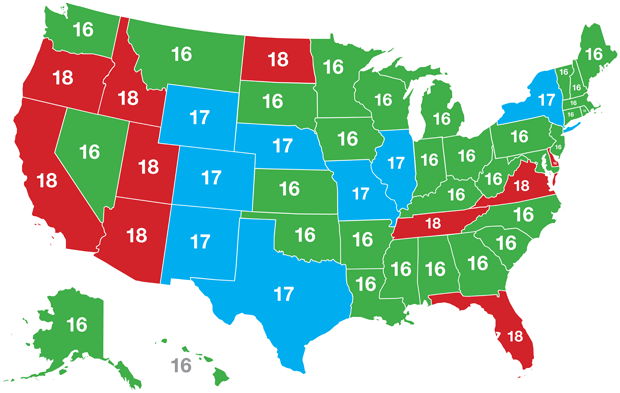An offshoot of this thread: Fictosexuals - Factual Questions - Straight Dope Message Board
Can a marriage be completed if one side does not clearly communicate consent?
Legally or morally? If you mean legally, yes. In many jurisdictions, including far too many in the United States, a child who cannot consent to contracts or sexual relations, can legally be married by parental consent. Whether the official would go forward with the marriage if the bride was being dragged screaming down the aisle, I don’t know.
In what jurisdictions in the U.S. is this still legal?
More than 40 of them.
Compare:
https://worldpopulationreview.com/state-rankings/marriage-age-by-state

Stranger
Consent of the parent for a person to marry is not the same as their consent overriding the non-consent of that person. In what jurisdictions can a person be forced to marry without their clear consent at the altar?
Not really a response to the question I am asking.
I wasn’t implying that it did. I was just saying that a child of 16 can’t legally consent to anything, but we have allowed carve outs for marriage so long as the parents agree. I see that’s not what you are getting at with your question though.
That is a nonsensical statement in a legal context where ‘consent’ isn’t just agreeing but having the recognized legal capacity to formulate intent, which is generally recognized as 18 in most legal arrangements (and somewhat less for carnal relations depending on the state). Realistically, young women (and to a much lesser extent, young men) are pressured and coerced into marriage at an age when they can neither legally form sexual consent nor live independently of parents or guardians, and no state in the United States explicitly prohibits this, although at least three of them to set the minimum age to marry at legal majority which is a de facto prohibition on child marriage of unions conducted in-state (but not child brides transported across state borders).
In the case of ‘fictosexuals’, since one party in the arrangement is not a legal person (not even under the fiction that corporations are people) there is no marriage as far as the courts are concerned, so the question is null.
Stranger
The “age of consent” for sexual intercourse varies, but in many states it is 16. If this is the kind of “consent” that @Czarcasm is asking about, the table in the Wikipedia article that @mjmartin linked to shows that there are some states (but by no means all) in which it is possible to marry below the “age of consent” in that sense.
This thread isn’t about “Age Of Consent”. I think I will apply the K.I.S.S. Rule to my query:
Two people, both of legal age, are at the altar. The person officiating the marriage asks person #1 “Do you take this person…” and person #1 says “Yes”. They then ask person #2 “Do you take this person…”, and there is no response at all.
The question of underage consent is interesting, but I think that’s not necessarily what you’re asking. If I understand, you’re asking if the following events can happen anywhere (especially in the US):
- Entities A and B are not married.
- Entities A expresses willingness and intent to marry B.
- Entity B does not express willingness and intent to marry A.
- The state issues a marriage license that marries entities A and B.
Is that a fair formulation of the question?
Yes, that pretty much covers it.
Here’s the law in Washington
RCW 26.04.070
Form of solemnization.
In the solemnization of marriage no particular form is required, except that the parties thereto shall assent or declare in the presence of the minister, priest, imam, rabbi, or similar official of any religious organization, or judicial officer solemnizing the same, and in the presence of at least two attending witnesses, that they take each other to be spouses.
This question has an authoritative answer:
Westley: Did you say, “I do”?
Buttercup: No, we kind of skipped that part.
Westley: Then you’re not married. If you didn’t say it, you didn’t do it.
And North Carolina
This is such a niche question that I don’t know if anyone will have compiled the very similar language from every state, so, short of Googling the laws for each state, I’m not sure how you’ll get a cited answer.
But here’s the uncited answer: no, of course those four events can’t happen anywhere in the US.
Edit: I have no idea why the link came out that way, but the key language is that both parties must intend to marry; and, later on, that both parties must solemnly declare their intent to marry.
I believe the table in post #4 reflects the legal age for marriage without parental consent, the body of the article tells me that the minimum age WITH parental consent is much lower in some states and non-existent in others.
A child can consent to contracts which is exactly what happens even when they buy their school lunch (or anything at the store). Now there are limits as to the enforceability of a contract on the adult side and such a contract can be voided pretty easily on the child side but it still is a form of a contract. Basically the adult takes all the risk in such contracts, but the contract certainly exists.
never mind
I hope the FQ is answered to the point that I can share an anecdote. My parents married in NY in 1958. At the time the age of consent to get married was 18 for women and 21 for men. My mom was 19. My dad was two weeks shy of his 21st birthday so my grandma had to sign off on it.